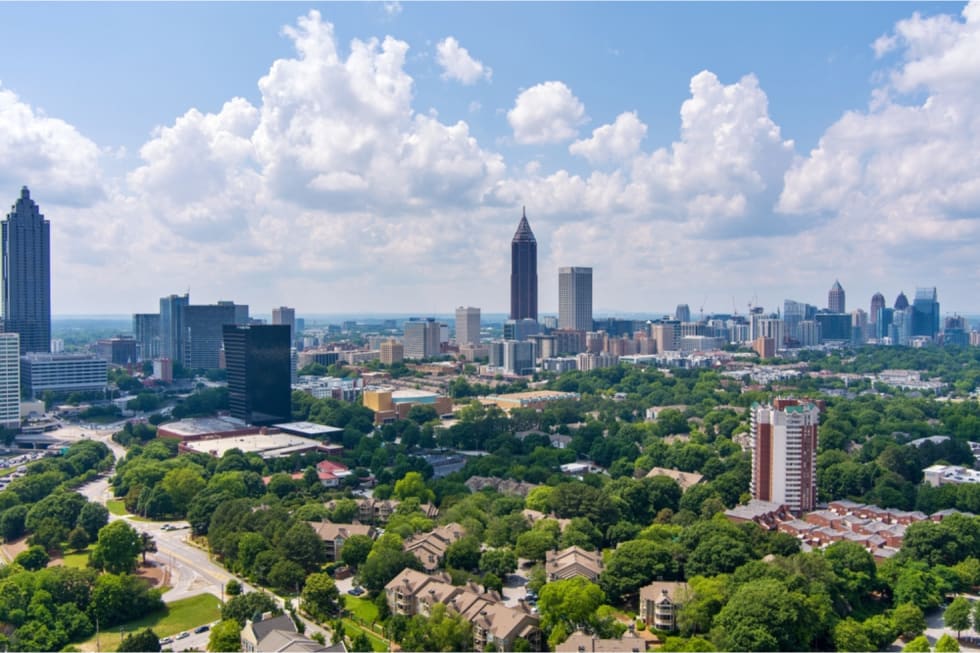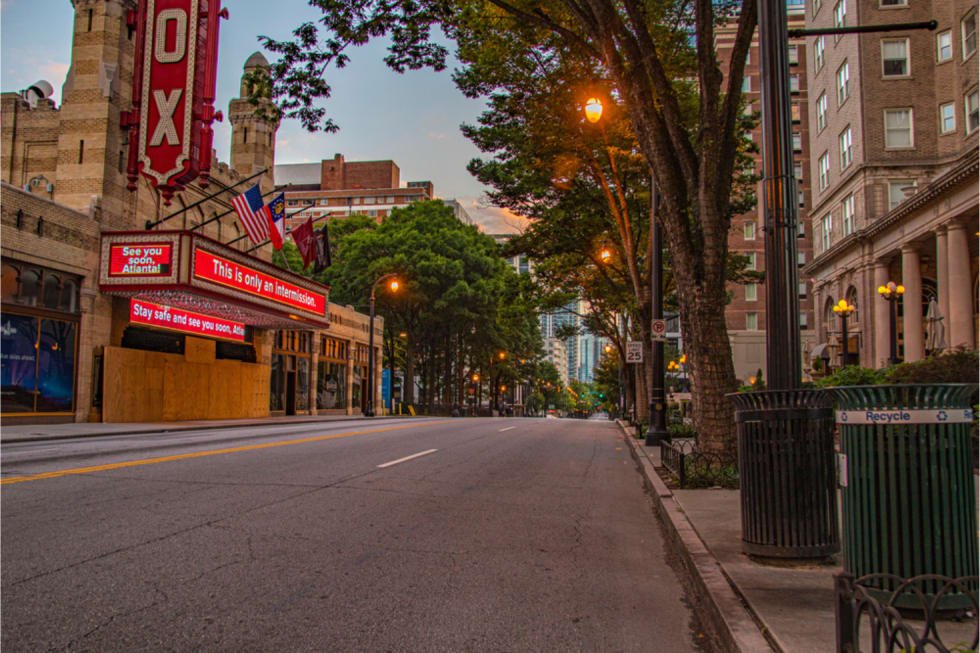- 46 units available
- 1 bed • 2 bed • 3 bed
- Amenities
In unit laundry, Hardwood floors, Dishwasher, 24hr maintenance, Stainless steel, Walk in closets + more

Thinking about renting in Atlanta but unsure what you can actually afford? You're not alone. Atlanta's mix of shiny high-rises, quiet neighborhoods, and everything in between means rental prices can swing fast depending on where you're looking. And with the market always shifting, budgeting can feel like guesswork.
We’re here to cut through the noise. This guide breaks down what Atlanta renters need to know about affordability in 2025. Whether you're moving to Atlanta for work, school, or just ready for a change, we'll help you figure out a rent range that makes sense—and show you tools to make your apartment search way less stressful.
Before you dive into listings, it helps to know a few common budgeting rules. None of them are perfect, but they offer solid starting points to avoid overspending (or underestimating what you can get).
This classic rule says you shouldn't spend more than 30% of your gross monthly income on rent. For example, if you make $4,000/month before taxes, aim for rent around $1,200. Simple enough. But in a city like Atlanta, where neighborhoods and prices vary wildly, this might feel more like a suggestion than a rule. Use it as a benchmark—not a dealbreaker.
Another approach breaks your after-tax income into 50% for needs (like rent and groceries), 30% for wants, and 20% for savings or debt. Rent is just one piece of that 50%, so you'll want to budget accordingly. The 50/30/20 rule is a more flexible method and helps balance housing costs with the rest of your financial life.
Landlords love this one: your gross monthly income should be at least 3x your rent. So for a $1,500 apartment, you’d need to earn $4,500/month. It helps them feel confident you can pay. If you don’t meet it exactly, a strong rental history or bigger deposit might still land you the lease.

Yes and no. Next to New York or San Francisco, it feels like a steal. But put it beside Columbus or Birmingham, and it’s not exactly a budget pick.
Median rents in Atlanta are above the national average, but you still get decent value for a major metro area—especially with the variety of neighborhoods to pick from.
Here’s how Atlanta stacks up in 2025:
| City | Average 1-Bedroom Rent | Cost of Living Index* | |
|---|---|---|---|
| New York, NY | $5,015 | 172.5 | |
| San Francisco, CA | $3,461 | 245.5 | |
| Atlanta, GA | $1,532 | 113.3 | |
| Austin, TX | $1,526 | 129.1 | |
| Birmingham, AL | $1,516 | 87 | |
| Columbus, OH | $1,454 | 91.4 |
*Cost of Living Index (U.S. average = 100) data sourced from BestPlaces.
As you can see, Atlanta ($1,532) lands in the middle tier—more affordable than coastal giants but pricier than some Midwestern and Southern cities. The benefit? You still get big-city perks like job opportunities, dining, and culture, without the sky-high rent of NYC or the Bay Area.
Here’s what Atlanta renters are seeing in 2025:
| Bedrooms | Median Rent Price |
|---|---|
| Overall | $1,528 |
| 1-Bedrooms | $1,532 |
| 2-Bedrooms | $1,533 |
One-bedroom apartments average $1,532, while two-bedrooms are close behind at $1,533.
Surprisingly close, right? That tight price range means you might get more space without a major price jump—a win if you're looking to share with a roommate, set up a home office, or just stretch out a little more.
Even better? This pricing sweet spot offers flexibility without forcing you into a compromise. You can prioritize the features that matter most—like natural light, updated appliances, or walkability—without blowing past your budget.
Want a breakdown by neighborhood? Here you go:
| Neighborhood | Starting 1-Bedroom Rent | Starting 2-Bedroom Rent |
|---|---|---|
| Intown South | $650 | $930 |
| Peoplestown | $1,445 | $1,880 |
| Brookhaven VIllage | $1,095 | $1,450 |
| Northeast Atlanta | $1,175 | $1,350 |
| Midtown | $1,195 | $1,947 |
| Buckhead | $1,099 | $1,388 |
Whether you're after energy-efficient new builds or charming older units with character, Atlanta's rental landscape has something for every renter—and every budget.
If you're eyeing the median one-bedroom rent of $1,532, you'll want to do some quick math to see what kind of income can comfortably support it. These common budgeting rules offer three different ways to break it down, depending on how strict or flexible you want to be with your finances:
| Affordability Rule | Required Monthly Income | Required Yearly Income |
|---|---|---|
| 30% Rule | $5,107 | $61,280 |
| 50/30/20 Rule (Rent = 50% of Needs)* | $3,064 (50% of income allocated to needs) | $36,768 |
| 3x Rent Rule | $4,596 | $55,152 |
*The 50/30/20 rule assumes rent is part of your "needs" category, so you'd allocate no more than 50% of your income to needs—including groceries, insurance, and utilities. This makes it a more flexible, full-picture budgeting tool than the others.
These guidelines are meant to keep your housing costs manageable, but they aren't one-size-fits-all. If you're paying off student loans or saving aggressively, the 30% rule might be best. If you're sharing costs with a partner or roommate, you might have more wiggle room. Ultimately, it's about balancing what you can afford with what feels right for your lifestyle.
Thinking about upgrading to a two-bedroom? As of 2025, the average rent for a two-bedroom apartment in Atlanta is $1,533. Whether you're splitting costs with a roommate, want a dedicated WFH setup, or just prefer the extra space, it's helpful to know what kind of income makes it doable.
| Affordability Rule | Required Monthly Income | Required Yearly Income |
|---|---|---|
| 30% Rule | $5,110 | $61,320 |
| 50/30/20 Rule (Rent = 50% of Needs)* | $3,066 (50% of income allocated to needs) | $36,792 |
| 3x Rent Rule | $4,599 | $55,188 |
Even if you're flying solo, a second bedroom might be worth it if it checks off the right boxes in your budget and lifestyle.

Living in Atlanta costs about 13% more than the U.S. average, driven mostly by housing—but that's not the whole story.
Utilities are higher too, averaging $308/month compared to $256 across Georgia and $253 nationally. And those sticky Southern summers? They can spike your power bill with constant A/C use, adding $50 or more to your monthly expenses.
Combine that with rising fuel and internet costs, and it's clear that renters need to consider more than just base rent when budgeting. These extras may seem small, but they add up quickly and can shift what "affordable" really means.
Rent and utilities are just the start. Living in Atlanta comes with a few more line items—and if you're budgeting smart (you are, right?), here’s what to factor in:

Atlanta rentals can move fast—and feel pricey—but finding a place that fits your budget isn’t out of reach. With a few smart strategies (and the right tools), you can skip the stress and lock in something great.
Here's how to rent smarter—not harder—in ATL:
Intown South, Brookhaven Village, and East Point offer lower rents without giving up access to the city. Some are even seeing new shops, parks, and transit upgrades—worth a look if you're flexible on location.
Splitting rent with a roommate or choosing a co-living arrangement can be one of the fastest ways to lower your monthly costs in Atlanta. These setups often come furnished and include utilities, which can make budgeting easier—and living less lonely, especially if you're new to the city or looking to expand your social circle.
Finding a budget-friendly apartment in Atlanta is achievable when you leverage the right resources. Apartment List’s rent calculator takes the guesswork out of it. Just plug in your income, needs, and perfect location, and we’ll match you with apartments you can actually afford. No more wasting time on places that don’t fit your budget.
Programs like Section 8 and LIHTC properties can offer lower rent based on your income. The Atlanta Housing Authority and local agencies list available options—but heads up: there are often waitlists, so apply early.
Fall and winter are usually slower seasons for rentals, which means more negotiation power. Ask about deals, waived fees, or reduced rent—especially if you’re signing a longer lease.
Your ideal Atlanta apartment isn’t just about rent—it’s about what fits your life. Apartment List’s helps you filter by budget, commute, and must-have features to match with the right homes fast.
Ready to stop searching and start matching? Take our quiz here. With us, you’ll spend 5 minutes and save 50 hours searching.
As of July 2025, the average rent is around $1,532 per month. Prices vary by neighborhood, building type, and amenities.
A salary between $60K and $70K/year is a good target. This keeps rent within 30% of income and covers other essentials too.
Ongoing expenses like student loans, credit card payments, childcare, or healthcare can limit how much you can reasonably spend on housing. Lifestyle choices—like dining out often or traveling—plus your savings goals also play a big role. The more you understand your full financial picture, the easier it is to land on a rent number that actually works for you.
In Atlanta, landlords can legally charge up to two months' rent as a security deposit. For example, on a $1,500 apartment, that could be as much as $3,000 upfront. Be sure to ask about additional move-in costs too—like application fees, admin charges, and pet deposits—so you’re not caught off guard by your total out-of-pocket expenses.
Not hitting the 3x rent mark doesn’t mean you’re out of luck. Some landlords may still approve you if you offer a larger security deposit, bring on a co-signer, or have a strong rental history. Affordable housing programs or communities with income-based qualifications might also use a more lenient standard—like 2.5x or even 1.5x rent—especially if you have a housing voucher.
Usually not. Most Atlanta rentals require tenants to pay separately for electricity, gas, water, trash, and sometimes internet or pest control. Some buildings may include one or two of these costs in the rent, so always check the lease or ask directly to avoid budgeting surprises.
Atlanta renters have a few key protections to know about. The Safe at Home Act (HB404) requires landlords to maintain livable housing—think no mold, working plumbing, and basic safety standards. It also prohibits utility shutoffs for unpaid rent and mandates a three-day notice before eviction proceedings. Georgia law also caps security deposits at two months’ rent and protects tenants from discrimination based on race, religion, disability, and more. If you're ever unsure about your rights, the Georgia Landlord-Tenant Handbook is a helpful resource.

In unit laundry, Hardwood floors, Dishwasher, 24hr maintenance, Stainless steel, Walk in closets + more
In unit laundry, Granite counters, Pet friendly, Stainless steel, Walk in closets, Gym + more